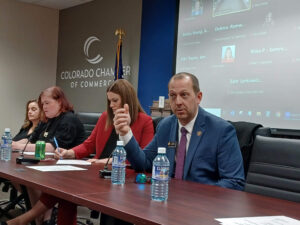Colorado oil and gas companies, already charged with cutting their pollutants and greenhouse gas emissions, soon will enter another new conservation discussion — this one on how they can reduce the amount of fresh water used in well operations.
Gov. Jared Polis on June 7 signed House Bill 1242, which requires oil and gas producers to report more data on water usage and mandates the Colorado Oil and Gas Conservation Commission to pass new rules in 2024 on how to reduce fresh water going into wells and boost recycled water. The bill also creates a new produced water consortium that will bring together industry leaders, environmental groups and water-focused research institutions to recommend ways to replace fresh water with reused water — a provision added at industry urging.
HB 1242, which fracking watchdog organization Colorado Rising began to develop last summer, was a more prescriptive bill at introduction, seeking to tie permit approvals to reduction of freshwater usage and to require reporting on PFAS chemicals in produced water. But sponsoring Democratic Reps. Andy Boesenecker of Fort Collins and Junie Joseph of Boulder rewrote it as a bill focused on getting more data about the type of water being used to develop and operate wells and to establish timelines in coming up with new goals and rules on water use.
Focused on a single industry
The bill comes as the Rocky Mountain West is in the midst of its most significant drought in 1,200 years and as federal officials seek to reduce water usage by the seven states drawing from the Colorado River in order to preserve precious water supplies. But it is narrowly focused on water usage by one industry — an industry that, as groups like American Petroleum Institute and the Colorado Oil & Gas Association noted, uses less than 1% of the state’s consumed water, versus the 85% used by the agriculture sector.
The concern, Colorado Rising representative Mike Foote explained to the House Energy and Environment Committee in March, is that while most agricultural water is recycled and reused, a higher percentage of oil and gas water is used only once. And the percentage of water employed by the sector that is recycled varies wildly from basin to basin based on available infrastructure and geologic needs, with some Western Slope producers hitting 90% reuse while those in the Denver-Julesburg Basin used vastly more fresh water.
Where the oil and gas industry and business groups like the Colorado Chamber of Commerce went through highly contentious negotiations over HB 1294, an air-quality-permitting bill that created an interim legislative committee on ozone air quality that will begin meeting later this year, discussions around HB 1242 were more cooperative. Several organizations expressed relief that sponsors removed from the bill specific requirements to cut freshwater usage 75% by 2026 and 90% by 2030 and that the rules COGCC is developing will be influenced heavily by a consortium of experts on the subject.

Kalt Schwartz is director of American Petroleum Institute Colorado.
“I think that’s a good place for that conversation to live,” API Colorado Director Kait Schwartz said of the consortium. “It’s a highly technical, difficult conversation for legislators to make decisions on.”
Consortium details
State officials must appoint 22 members to the consortium — four from state or federal agencies dealing with produced water, four from research institutions, four from environmental organizations, four from the oil and gas industry and two from local governments. The Colorado Senate president and Colorado House speaker will add three members from environmental-justice organizations and three more advocating for disproportionately impacted communities, in which new produced water storage or treatment facilities are barred from locating.
Boesenecker also told the House committee that he believes the consortium will be able to come up with consensus solutions.
“I’m especially excited about the produced water consortium … to develop specific goals for produced water and recycling,” the legislator said. “This bill presents an incredible opportunity to have a collaborative, data-driven approach.”

Colorado state Rep. Andy Boesenecker speaks to the Colorado Chamber of Commerce Health Policy Council in March 2023.
New reporting mandates
First, though, producers will be hit with new reporting requirements on their water usage that will not be an insignificant lift.
Beginning in September, operators must include in already required monthly reports the volume of all fresh water and recycled water used downhole, the volume of all produced water pulled from the well and the disposal method, location and volume of produced water. And next year, they must file quarterly reports on where their fresh water was acquired, the source of all recycled water and the volume of all water produced and disposed from wells.
That data, which is much more granular that what producers must now report, will factor heavily into the rules COGCC must adopt by December 2024 to require a statewide reduction in freshwater usage at well locations and a corresponding increase in recycled water there. Under HB 1242, those rules must require permit applicants to detail plans on how to decrease freshwater usage without increasing emissions and require that operators report vehicle miles traveled in relation to management of fresh water and produced water.
Concerns about use of fresh water
A plethora of environmental advocates noted that there are more than 49,000 active wells in the state and that each well can be a significant water user. Adams County Commissioner Emma Pinter told the Senate Transportation and Energy Committee that the average well in Denver-Julesburg Basin located along the northern Front Range uses between 17.9 million and 24 million gallons of water.
“I support this bill so we may capture the scope of the water being used by the oil and gas industry. At this point, it’s just a nebulous number,” said Rachael Lehman, a Community College of Denver assistant professor who’s convened discussions on the sociology of water. “Once we capture the scope, we can develop restrictions moving forward.”
Industry in agreement
Oil and gas industry leaders agree that they would like to reduce freshwater usage, though they noted that some fresh water is needed in drilling because it ensures compatibility with fluids in the basin. But they insisted that the consortium look at potential rule recommendations on a basin-by-basin basis rather than a one-size-fits-all approach.
“We understand that water is a precious commodity in our state and that every drop counts,” Bill Groffy, COGA director of legislative and regulatory affairs, told the House committee. “It’s essential for everybody to sit at the table and come up with consensus on these issues and on the targets.”
Once its members are appointed, the consortium is required to meet on a monthly basis for its first year and then on a quarterly basis in subsequent years to lay out an informed path for the recycling and reuse of produced water and to identify barriers associated with its utilization. HB 1242 lays out specific dates by which it must report on issues such as legislation needed to remove barriers to recycling and reuse of produced water, short- and long-term recycling goals and the infrastructure that will be needed to achieve different recycling levels.
